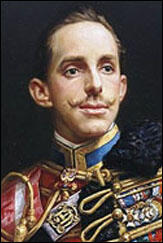Alfonso XIII

Alfonso, the posthumous son of Alfonso XII and Maria Christina of Austria, was born in Madrid, Spain, on 17th May 1886. His mother acted as regent until 1902 when he assumed full power.
In 1906 Alfonso XIII married Princess Ena of Battenberg, granddaughter of Queen Victoria. An attempt was made to kill the couple on their wedding day. This was the first of several attempts to kill Alfonso.
Alfonso XIII became increasingly autocratic and in 1909 was condemned for ordering the execution of the radical leader, Ferrer Guardia, in Barcelona. He also prevented liberal reforms being introduced before the First World War.
Blamed for the Spanish defeat in the Moroccan War (1921) Alfonso XIII was in constant conflict with Spanish politicians. His anti-democratic views encouraged Miguel Primo de Rivera to lead a military coup in 1923. Alfonso gave his support to Rivera's military dictatorship but Rivera lost power in 1930 and the following year he agreed to democratic elections.
When the Spanish people voted overwhelmingly for a republic, Alfonso was advised that the only way to avoid large-scale violence was to go into exile. Alfonso agreed and left the country on 14th April, 1931.
When the Spanish Civil War broke out Alfonso made it clear he favoured the military uprising against the Popular Front government. However, in September 1936 General Francisco Franco announced that the Nationalists would never accept Alfonso as king.
Alfonso XIII died in Rome, Italy, on 28th February, 1941.
Primary Sources
(1) Miguel Primo de Rivera, speech (September 1923)
We have reason on our side and, therefore, force, though so far we have used force with moderation. If an attempt is made to trick us into a compromise which our conscience considers dishonourable, we shall demand greater penalties, and impose them with greater severity. Neither I, nor the garrisons of Aragon, from whom I have just received a telegram in support, will agree to anything but a military dictatorship. If the politicians make an attempt to defend themselves, we shall do the same, relying on the help of the people, whose reserves of energy are great. Today we are resolved on moderation, but, on the other hand, we shall not shrink from bloodshed.
(2) King Alfonso XIII, statement (14th April 1931)
Sunday's elections have shown me that I no longer enjoy the love of my people. I could very easily find means to support my royal powers against all comers, but I am determined to have nothing to do with setting one of my countrymen against another in a fratricidal civil war. Thus, until the nation speaks, I shall deliberately suspend the use of my royal prerogative.
(3) Dorothy Parker, broadcast, Madrid Radio (October 1937)
Six years ago, when the Royal romp, Alfonso, left his racing cars and his racing stables and also left, by popular request, his country, there remained 28 million people. Of them, 12 million were completely illiterate. It is said that Alfonso himself had been taught to read and write, but he had not bothered to bend the accomplishments to the reading of statistics nor the signing of appropriations for schools.
Six years ago, almost half the population of this country was illiterate. The first thing that the Republican government did was to recognise this hunger, the starvation of the people for education. Now there are schools even in the tiniest, poorest, villages; more schools in a year than ever were in all the years of the reigning kings. And still more are established every day. I have seen a city bombed by night, and the next morning the people rose and went on with the
completion of their schools. Here in Madrid, as well as in Valencia, a workers' institute is open. It is a college, but not a college where rich young men go to make friends with other rich young men who may be valuable to them in business with them later. It is a college where workers, forced to start as children in fields and factories, may study to be teachers or doctors or lawyers or scientists, according to their gifts. Their intensive university course takes two years. And while they are studying, the government pays their families the money they would have been earning.
In the schools for young children, there is none of the dread thing you have heard so much about - depersonalisation. Each child has, at the government's expense, an education as modern and personal as a privileged American school child has at an accredited progressive school. What the Spanish government has done for education would be a magnificent achievement, even in days of peace, when money is easy and supplies are endless. But these people are doing it under fire.


